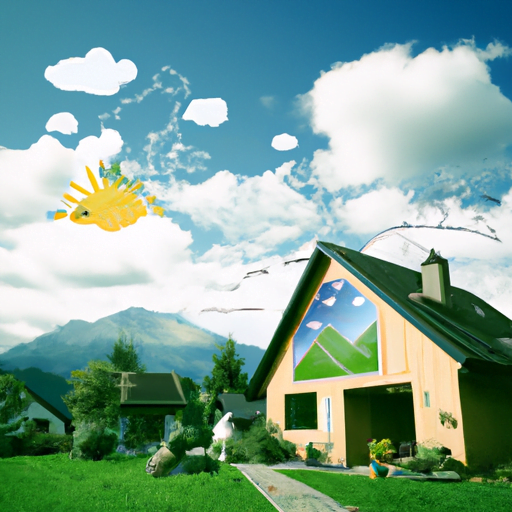So here’s the deal: you’re tired of the daily grind, the rat race, and the monotony of traditional employment. You dream of living off-grid, disconnected from the hustle and bustle of society, and embracing a simpler way of life. But there’s just one question nagging at the back of your mind: can you actually have a regular job and still live off-grid? In this article, I’ll explore the possibilities and discuss how it’s not only feasible but also incredibly rewarding to strike a balance between a conventional job and an off-grid lifestyle. It’s time to break free from societal norms and discover the perfect harmony between work and the serenity of nature.

Benefits of Living Off-Grid
Living off-grid can offer a multitude of benefits for those seeking a more independent and sustainable lifestyle. From being more self-sufficient to reducing living expenses, living off-grid can provide a sense of freedom and fulfillment. Let’s explore some of the key benefits in more detail.
Independence and Self-Sufficiency
One of the most appealing aspects of living off-grid is the independence that it brings. By relying less on traditional utilities and amenities, such as electricity, water, and gas, individuals can develop their own self-sufficiency. Generating your own power through renewable energy sources like solar panels or wind turbines allows you to be less dependent on the grid and gives you greater control over your energy supply.
Additionally, cultivating your own food through gardening or keeping livestock can provide a sense of fulfillment and self-reliance. By growing your own vegetables and fruits or raising chickens for eggs, you can greatly reduce your reliance on grocery stores and experience the satisfaction of eating what you’ve nurtured.
Environmental Sustainability
Living off-grid promotes environmental sustainability by reducing your carbon footprint. By generating renewable energy and using sustainable practices, such as rainwater harvesting and composting, you can significantly minimize your impact on the environment. This lifestyle encourages the use of eco-friendly technology and conservation techniques, which can ultimately contribute to preserving our planet for future generations.
Reduced Living Expenses
Another compelling benefit of living off-grid is the potential for reduced living expenses. By generating your own energy and reducing your reliance on public utilities, you can significantly decrease your monthly bills. While the initial setup cost of installing renewable energy systems and creating self-sufficient infrastructures may require an investment, the long-term savings can be considerable.
Moreover, growing your own food can help cut down on grocery expenses, and living in a more self-sustainable manner generally reduces the need for excessive consumption. By adopting a minimalist mindset and embracing a simpler lifestyle, you can discover that you need much less to live comfortably and contentedly.
Challenges of Living Off-Grid
While living off-grid offers numerous benefits, it also presents its fair share of challenges. From limited access to amenities to the potential for isolation and loneliness, it’s important to consider these factors before embarking on an off-grid lifestyle.
Limited Access to Amenities
Living off-grid often means being farther away from urban centers, which may result in limited access to amenities such as grocery stores, medical facilities, and entertainment venues. Depending on your location, the nearest convenience store or hospital could be miles away, requiring careful planning and preparedness to ensure your essential needs are met.
Energy Management
Managing energy usage and maintaining a reliable power supply can be challenging when living off-grid. During periods of low sunlight for solar panels or insufficient wind for wind turbines, alternative energy sources may be necessary to meet your energy needs. Developing a deep understanding of energy conservation and becoming proficient in energy management is essential for a successful off-grid lifestyle.
Isolation and Loneliness
Living off-grid can be a solitary experience, especially if you choose a remote location with limited community interaction. The absence of neighbors or a bustling community can lead to feelings of isolation and loneliness. It’s crucial to consider whether you are comfortable with solitude and have strategies in place to mitigate loneliness, such as engaging in local community activities or joining off-grid networks.
Balancing a Regular Job and Off-Grid Living
While living off-grid can offer a more independent and sustainable lifestyle, it does not necessarily mean you have to give up your regular job. With thoughtful planning and strategic decision-making, it is possible to balance an off-grid lifestyle with various job opportunities. Here are some key considerations to ensure a successful combination of an off-grid lifestyle and your career.
Assessing Your Lifestyle Needs
Before pursuing off-grid living while maintaining a regular job, it’s important to assess your lifestyle needs. Consider the amenities and services you require on a daily basis, as well as your family’s needs if applicable. Reflecting on these factors will help you determine the level of self-sufficiency required and guide your decisions when choosing an ideal off-grid location.
Choosing a Suitable Off-Grid Location
When looking for an off-grid location that can accommodate both your lifestyle needs and work opportunities, consider factors such as proximity to job centers, availability of high-speed internet, and access to transportation. While a more remote location may offer peace and tranquility, it may also limit your job prospects. Striking the right balance between nature and work accessibility is vital.
Remote Working Opportunities
With the digital age enabling remote work opportunities, more and more professionals are finding the flexibility to work from anywhere, including off-grid locations. If your current job allows remote work or if you have a skill set that can be performed online, explore the possibility of working remotely while enjoying an off-grid lifestyle. It’s important to have a stable internet connection and a dedicated workspace to ensure productivity.

Creating an Off-Grid Living Plan
To successfully live off-grid, it is essential to have a well-thought-out plan in place. This plan should encompass key areas such as energy generation and storage, water management, and food production. Taking proactive measures and investing in the necessary infrastructure will ensure a smooth off-grid journey.
Energy Generation and Storage
When living off-grid, reliable energy generation and storage systems are crucial. Solar panels, wind turbines, or hydropower systems can be employed to generate renewable energy. Depending on your energy consumption and the fluctuations in energy production, efficient battery storage systems can store excess energy for use during low-production periods. It’s important to invest in high-quality equipment and regularly maintain your energy systems to ensure optimal performance.
Water Management
Water is a vital resource when living off-grid, and efficient water management is essential. Rainwater harvesting systems, wells, or natural springs can provide a sustainable water source. Implementing water-saving measures, such as low-flow fixtures and graywater recycling systems, can further reduce water consumption. It’s crucial to regularly test the quality of your water source and have backup plans in case of water scarcity.
Food Production
Growing your own food is a cornerstone of off-grid living. Whether through gardening, permaculture, aquaponics, or raising animals for meat and dairy, producing your own food can contribute to self-sufficiency and reduce dependence on external food sources. It’s important to research suitable crops and livestock for your specific climate and invest time and effort into learning sustainable agricultural practices.
Managing Finances and Off-Grid Living
Successfully managing your finances is crucial when living off-grid. While reduced living expenses can be a benefit, careful budgeting, saving, and exploring alternative income streams are necessary for financial stability.
Budgeting for Off-Grid Lifestyle
Creating a detailed budget is essential to manage your expenses effectively. Consider factors such as ongoing costs for energy generation and storage systems, water management infrastructure, and any ongoing maintenance or upgrades required for a sustainable off-grid lifestyle. Account for potential emergencies or unforeseen expenses to avoid financial strain.
Saving and Investments
Building an emergency fund is essential for off-grid living. Being prepared for unexpected expenses or repairs is crucial to maintain a comfortable and secure lifestyle. Additionally, exploring investment opportunities, such as stocks, bonds, or real estate, can help grow your financial resources in the long term. Consult with a financial advisor to make informed investment decisions aligned with your off-grid lifestyle goals.
Alternative Income Streams
Living off-grid doesn’t mean you have to rely solely on a regular job for income. Explore alternative income streams that align with your skills and interests, such as freelance work, online businesses, or monetizing your self-sustainable lifestyle through educational workshops or renting out sustainable accommodations. Diversifying your income sources can enhance your financial stability and flexibility.
Building a Support System
While off-grid living provides independence, building a support system is crucial for both practical assistance and social connections. Engaging with local communities, joining off-grid networks, and seeking professional advice can significantly contribute to the success of your off-grid lifestyle.
Engaging with Local Communities
Connecting with local communities can provide valuable support and opportunities for collaboration. Attend local events, join community groups, or participate in workshops related to sustainable living. By engaging with like-minded individuals, you can learn from their experiences, share resources, and create a network of support.
Joining Off-Grid Networks
Online communities and forums dedicated to off-grid living are excellent resources for information exchange, advice, and networking. Joining platforms specific to off-grid lifestyles can connect you with individuals who have similar goals and challenges. Participate actively in these networks, ask questions, and share your experiences to foster a sense of community.
Seeking Professional Advice
Consulting with professionals who specialize in off-grid living can provide valuable guidance and ensure that you make informed decisions. Seek advice from experts in renewable energy systems, sustainable agriculture, and water management to optimize your off-grid setup and address any challenges or concerns you may encounter.
Ensuring Health and Safety
Prioritizing health and safety when living off-grid is of utmost importance. Being prepared for medical emergencies, implementing fire safety measures, and taking security precautions are essential for a safe and secure off-grid lifestyle.
Medical Emergencies and Access
Living in remote off-grid locations may result in limited access to medical facilities. It is crucial to have a well-stocked first aid kit, acquire basic medical training, and develop communication strategies in case of emergencies. Consider building relationships with local healthcare professionals and exploring telemedicine options for remote consultations.
Fire Safety and Emergency Preparedness
Living in nature or using alternative energy sources can present fire risks. Implementing fire safety measures such as installing fire extinguishers, maintaining clear and well-managed surroundings, and having an evacuation plan is essential. Regularly assess your property for potential fire hazards and stay informed about fire safety protocols in your area.
Security Measures
Living off-grid can also mean being in more secluded areas, potentially increasing security concerns. Assessing your property’s vulnerabilities, installing security systems, and developing a community watch program can help deter intruders and safeguard your home. Additionally, investing in emergency communication devices can ensure you can reach out for help when needed.
Sustainable Transportation Options
Consideration for sustainable transportation choices aligns with an off-grid lifestyle’s ethos. Striving to reduce carbon emissions and limiting reliance on fossil fuels can be achieved by exploring alternative transportation options.
Public Transportation Alternatives
In some off-grid locations, public transportation options may be limited. However, when available, utilizing public transportation, such as buses or trains, can significantly reduce the environmental impact of your travels. Carpooling or ridesharing initiatives within off-grid communities can also contribute to sustainable transportation practices.
Electric Vehicles and Charging Infrastructure
Transitioning to electric vehicles (EVs) for your transportation needs can greatly reduce your carbon footprint. With advancements in EV technology, the range and accessibility of electric vehicles are increasing. When transitioning to an EV, consider installing charging infrastructure on your property to ensure convenient and sustainable travel.
Cycling and Walking
Living off-grid often means being in closer proximity to nature, which creates opportunities for more active modes of transportation such as cycling and walking. Incorporating these sustainable forms of transportation into your daily routine not only reduces carbon emissions but also promotes a healthier lifestyle. Create designated paths or trails within your property for safe and enjoyable cycling and walking experiences.
Maintaining Work-Life Balance
Living off-grid can provide an excellent opportunity to achieve a healthy work-life balance. Here are some strategies to help maintain this equilibrium.
Time Management Strategies
Living off-grid allows for a more flexible lifestyle, but it is essential to establish effective time management strategies. Setting realistic schedules, prioritizing tasks, and maintaining a disciplined routine can help ensure you accomplish your work responsibilities while still having time for leisure activities and self-care.
Creating Dedicated Workspaces
Designating specific areas within your off-grid property as dedicated workspaces can improve focus and productivity. Establishing a separate office or utilizing natural surroundings for an outdoor office can help create a conducive working environment. Additionally, having a physical separation between work and living spaces can help maintain a clear boundary between the two.
Setting Realistic Boundaries
Establishing boundaries between work and personal life is crucial when living off-grid. Ensure a healthy work-life balance by setting clear expectations with yourself, colleagues, and clients regarding availability and working hours. By defining specific times when work is off-limits, you can fully immerse yourself in off-grid activities and enjoy the benefits of this lifestyle.
Continual Learning and Skill Development
Embracing an off-grid lifestyle offers numerous learning opportunities to acquire new skills and knowledge. Here are some areas to focus on for continual learning and skill development.
Staying Updated with Technology and Trends
Living off-grid doesn’t mean disconnecting from technological advancements. It’s important to stay informed about the latest sustainable technologies, energy-efficient appliances, and eco-friendly innovations that can enhance your off-grid experience. Continually educating yourself about relevant trends can help you make informed decisions and optimize your off-grid setup.
Acquiring Homesteading Skills
Homesteading skills are essential for self-sustainability and off-grid living. Learning skills such as organic gardening, animal husbandry, food preservation, and off-grid construction techniques can empower you to be more self-reliant and resilient. Take courses, attend workshops, or connect with experts in these areas to gain the knowledge and confidence to thrive in your off-grid lifestyle.
Educational Opportunities
Living off-grid opens up opportunities for hands-on and experiential learning. Take advantage of local educational programs, workshops, and seminars that focus on sustainable living, permaculture, renewable energy systems, or other relevant topics. Engaging in these educational opportunities will deepen your understanding of off-grid living and enable you to continually enhance your skill set.
Living off-grid can be a fulfilling and rewarding lifestyle choice, offering independence, environmental sustainability, and reduced living expenses. By overcoming the challenges, creating a comprehensive off-grid living plan, managing finances, building a support system, prioritizing health and safety, adopting sustainable transportation practices, maintaining work-life balance, and continually learning and developing skills, you can embrace the off-grid lifestyle with confidence and enthusiasm.




